英语句子成分分析
英语句子成分分析必备(超实用)

句子成分分析一、主语主语是放在句子中说明全句中心主题的部分。
一般由名词、代词、不定式、动名词或从句充当。
【一般放在句首】1、English is very important.(英语是很重要的)2、A tree has fallen across the road.(一棵树倒下横在马路上)3、Little streams feed big rivers (小河流入大江)1、You’re not far wrong.(你差不多对了)2、He told a joke but it fell flat. (他说了个笑话,但没有引人发笑)3、They go to school by bus.(他们乘公共汽车去上学)4、Most of the students come from the countryside.(大多数的学生来自农村)1、Watching TV too much is bad for your eyes. (看太多的电视对你的眼睛有害的)2、It’s no use regretting it.(后悔是没有用的)3、Smoking is bad for you. (吸烟对你有害)4、To see is to believe.(眼见为实/百闻不如一见)5、It is very hard to get to sleep.(入睡很难。
)6、To find your way can be a problem.(你能否找到路可能是一个问题。
)7、It would be nice to see him again. (如能见到他,那将是一件愉快的事。
)1、Three is enough. (三个就够了)2、Four from seven leaves three.(7减4还剩3)1、Whenever you are ready will be fine. (你无论什么时候准备好都行。
)2、Because Sally wants to leaves doesn’t mean that we have to.(不能说萨利要走因而我们也得走。
英语句子成分分析

代词作主语
• They go to school by bus. 他们乘公共汽车上学。 • Most of the students come from the countryside. 大多数 学生来自农村。
动名词作主语
• Watching TV too much is bad for your eyes. 看电视太多对 你的眼睛是有害的。 • It’s no use regretting it. 后悔是无用的。
表语
• 表语与连系动词连用,构成系表结 构,说明主语的身份或特征,一般 由形容词、名词、动名词、动词不 定式、分词等充当。如:
• They are brother and sister. 他们是兄妹。 • What I want to say is this. 我想说的就是这 点。 • Her father is sixty-five. 她父亲65岁。
• Would you like something to drink? 你想要些喝 的东西吗? • A barking dog seldom bites. 吠狗很少咬人。 • A man going to die is always kind-hearted. 人之 将死,其言也善。 • The suggestion sent to the committee was adopted. 送往委员会的建议被采纳了。 • Do you know the man who is standing next to Mr. Green? 你认识站在格林先生旁边的那个人吗?
• Why don’t you have your hair cut? 你为什么不理 发? • He had his finger cut. 他的手指弄伤了。 • I had my watch stolen yesterday. 我的表昨天被 人偷去了。 • I have a lot of work to do. 我有许多工作要做。 • She has plenty of clothes to wear. 她有足够的衣 服穿。 • He made me repeat the story. 他要我把那事重讲 一遍。 • Rain makes plants grow. 雨水使植物生长。
英语句子成分分析
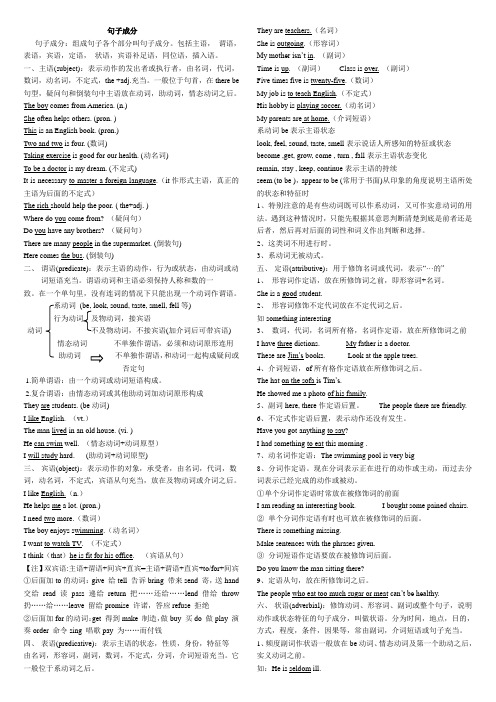
句子成分句子成分:组成句子各个部分叫句子成分。
包括主语,谓语,表语,宾语,定语,状语,宾语补足语,同位语,插入语。
一、主语(subject):表示动作的发出者或执行者,由名词,代词,数词,动名词,不定式,the +adj.充当。
一般位于句首,在there be句型,疑问句和倒装句中主语放在动词,助动词,情态动词之后。
The boy comes from America. (n.)She often helps others. (pron. )This is an English book. (pron.)Two and two is four. (数词)Taking exercise is good for our health. (动名词)To be a doctor is my dream. (不定式)It is necessary to master a foreign language.(it作形式主语,真正的主语为后面的不定式)The rich should help the poor. ( the+adj. )Where do you come from? (疑问句)Do you have any brothers? (疑问句)There are many people in the supermarket. (倒装句)Here comes the bus. (倒装句)二、谓语(predicate):表示主语的动作,行为或状态,由动词或动词短语充当。
谓语动词和主语必须保持人称和数的一致。
在一个单句里,没有连词的情况下只能出现一个动词作谓语。
系动词(be, look, sound, taste, smell, fell等)行为动词及物动词,接宾语动词不及物动词,不接宾语(加介词后可带宾语)情态动词不单独作谓语,必须和动词原形连用助动词不单独作谓语,和动词一起构成疑问或否定句1.简单谓语:由一个动词或动词短语构成。
英语语法句子成分分析
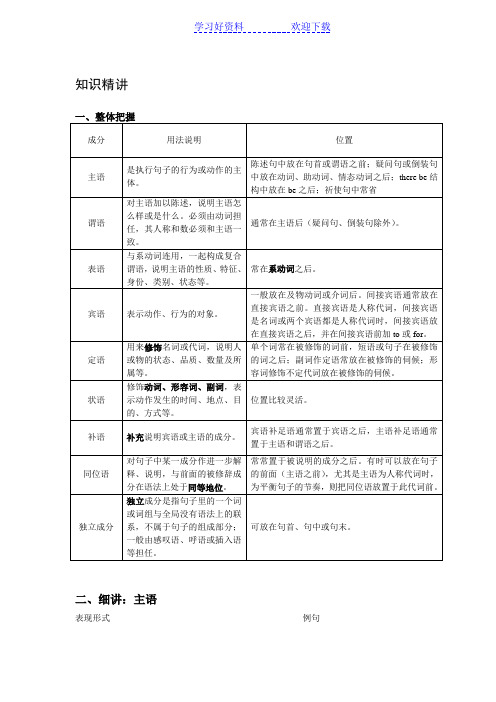
知识精讲二、细讲:主语表现形式例句三、谓语四、表语五.宾语1.宾语的分类六、定语巧学妙计:一般来说,单个形容词、分词、代词、数词或名词作为定于位于被修饰的名词的前面,叫做“前置定语”;副词、介词短语、形容词短语、分词短语、不定式(短语)和定语从句作定语位于被修饰的名词的后面,叫做“后置定语”。
七、状语1. 状语的分类八、补语九、同位语练习与巩固一、指出下列句子划线部分是什么句子成分:1.The students got on the school bus.2. He handed me the newspaper.3. I shall answer your question after class.4. What a beautiful Chinese painting!5. They went hunting together early in the morning.6. His job is to train swimmers.7. He took many photos of the palaces in Beijing.8. There is going to be an American film tonight.9. He is to leave for Shanghai tomorrow.10. His wish is to become a scientist.11. He managed to finish the work in time.12. Tom came to ask me for advice.13. He found it important to master English.14. Do you have anything else to say?15. To be honest, your pronunciation is not so good.16. Would you please tell me your address?17. He sat there, reading a newspaper.18. It is our duty to keep our classroom clean and tidy.19. He noticed a man enter the room.20. The apples tasted sweet.二、分析下列句子成分1. Our school is not far from my home.2. It is a great pleasure to talk with you3. All of us considered him honest.4. My grandfather bought me a pair of sports shoes.5. He broke a piece of glass.6.He made it clear that he would leave the city.7. ---I love you more than her,child .8. Tees turn green when spring comes.9. They pushed the door open.10. Grandma told me an interesting story last night.三.划分句子成分练习1.They are working on the farm now.2.Seeing is believing3.All of us like Kobe Bryant very much4.She became a doctor in 19985.The book lying on the floor are mine6.Suddenly it begins to rain7.To catch the train ,I got up early yesterday8.I always find her happy9.He wonders If I still study English10.The letter which I received the day before yesterday was a friend of mine11.We always work hard at English.12.He said he didn't come.13.She watched her daughter playing the piano.14.Speaking doesn't mean doing.15.Bye the time I got to the station,the train had left.16.The children bought their parents a car for the 25th anniversary of their marriage.17.It takes me an hour to get there.四、选择填空:( )1. ____ will leave for Beijing.A. Now there the manB. The man here nowC. The man who is here nowD. The man is here now( ) 2. The weather ____.A. wet and coldB. is wet and coldC. not wet and coldD. were wet and cold ( ) 3. The apple tasted ____.A. sweetsB. sweetlyC. nicelyD. sweet( ) 4. He got up ____ yesterday morning.A. latelyB. lateC. latestD. latter( )5. The actor ______at the age of 70.A. deadB. diedC. dyedD. deaded学习好资料欢迎下载( )6. ____ were all very tired, but none of ____ would stop to take a rest.A. We, usB. Us, weC. We, ourD. We, we( )7. He found the street much ______.A. crowdB. crowdingC. crowdedD. crowdedly ( ) 8.I think _____necessary to learn English well.A. itsB. itC. thatD. that is( ) 9. The dog ____ mad.A. looksB. is lookedC. is being lookedD. was looked ( )10.I will never forget the day ______ I joined the army.A.thatB. whenC. in whichD. Where四、1~5 CBDBB 6~10 ACBAB。
英语句子成分分析

英语句子成分分析英语句子成分分析是语法研究的重要内容之一。
它主要通过对英语句子的结构和语义进行分析,来揭示句子中各个成分之间的关系和作用。
下面我将为您详细阐述英语句子成分分析的相关知识。
一、名词短语(Noun Phrase)名词短语是由名词充当中心词,再加上其他修饰词来构成的短语。
名词短语可以作为句子的主语、宾语、补语等。
1. 主语(Subject)主语通常是句子的中心成分,它指出动作的执行者或者是表达状态的主体。
例句:The cat is sleeping.翻译:猫正在睡觉。
2. 宾语(Object)宾语是句子中受到动作影响的对象,它常跟在动词之后。
例句:I like apples.翻译:我喜欢苹果。
3. 补语(Complement)补语是用来补充说明主语或宾语的信息,起到对主谓关系进行补充和修饰的作用。
例句:She is a teacher.翻译:她是一位老师。
二、动词短语(Verb Phrase)动词短语是以动词为核心,并包含了与之相关的其他成分,如副词、介词短语等。
1. 谓语动词(Predicate Verb)谓语动词是句子中的核心成分,它直接说明主语的动作或状态。
例句:He is running.翻译:他正在跑步。
2. 直接宾语(Direct Object)直接宾语是跟在及物动词后面,指出受到动作影响的对象。
例句:She loves flowers.翻译:她喜欢花。
3. 间接宾语(Indirect Object)间接宾语是在及物动词之后,介词之前,用来指示动作的对象。
例句:He gave me a book.翻译:他给了我一本书。
三、形容词短语(Adjective Phrase)形容词短语是由形容词作为中心词,并可以加上其他修饰词来修饰名词或代词。
例句:The tall girl is my sister.翻译:那个高个子的女孩是我的姐姐。
四、副词短语(Adverb Phrase)副词短语是由副词作为中心词,并可以有其他修饰词来修饰动词、形容词或副词。
英语句子成分详细分析

一、句子成分(一)句子成分的定义:构成句子的各个部分叫做句子成分。
句子成分有主要成分和次要成分;主要成分有主语和谓语;次要成分有表语、宾语、定语、状语、补足语和同位语。
(二)主语:主语是一个句子所叙述的主体,一般位于句首。
但在there be结构、疑问句(当主语不疑问词时)和倒装句中,主语位于谓语、助动词或情态动词后面。
主语可由名词、代词、数词、不定式、动名词、名词化的形容词和主语从句等表示。
例如:During the 1990s, American country music has become more and more popular.(名词)We often speak English in class.(代词)One-third of the students in this class are girls.(数词)To swim in the river is a great pleasure.(不定式)Smoking does harm to the health.(动名词)The rich should help the poor.(名词化的形容词)When we are going to have an English test has not been decided.(主语从句)It is necessary to master a foreign language.(it作形式主语,真正的主语为后面的不定式)(三)谓语:谓语说明主语所做的动作或具有的特征和状态。
动词在句中作谓语,一般放在主语之后。
谓语的构成如下:1、简单谓语:由一个动词或动词短语构成。
如:He practices running every morning.2、复合谓语:(1)由情态动词或其他助动词加动词原形构成。
如:You may keep the book for two weeks. He has caught a bad cold. (2)由系动词加表语构成。
英语句子成分分析

1英语句子成分讲座·主语 句子一般要有主语。
在简单句中,主语一般由名词、代词、动名词或动词不定式(短语) 来充当。
动名词、动词不定式作主语时通常用充当。
动名词、动词不定式作主语时通常用 it 作形式主语。
作形式主语。
■名词作主语名词作主语English is very important. 英语是很重要的。
英语是很重要的。
The students all love their English teacher. 这些学生都爱他们的英语老师。
这些学生都爱他们的英语老师。
■代词作主语代词作主语They go to school by bus. 他们乘公共汽车上学。
他们乘公共汽车上学。
Most of the students come from the countryside. 大多数学生来自农村。
大多数学生来自农村。
■动名词作主语动名词作主语Watching TV too much is bad for your eyes. 看电视太多对你的眼睛是有害的。
看电视太多对你的眼睛是有害的。
It’s no use regretting it. 后悔是无用的。
后悔是无用的。
■动词不定式(短语)作主语作主语To see is to believe. 眼见为实。
眼见为实。
It is very hard to get to sleep. 入睡很难。
入睡很难。
2.英语句子成分讲座·谓语谓语必须由动词充当,谓语必须由动词充当,但动词不定式、但动词不定式、但动词不定式、动名词、动名词、分词为非谓语动词不能作谓语。
分词为非谓语动词不能作谓语。
可作谓语的可作谓语的动词一般为行为动词(表动作)和连系动词(表状态),行为动词根据其后是否可直接接宾语,又可分为及物动词和不及物动词。
又可分为及物动词和不及物动词。
■及物动词作谓语及物动词作谓语We should help each other. 我们应该互相帮助。
英语句子成分分析
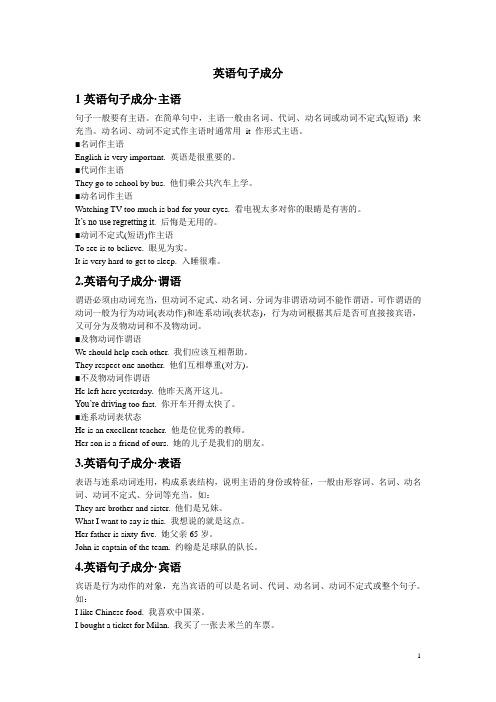
英语句子成分1英语句子成分·主语句子一般要有主语。
在简单句中,主语一般由名词、代词、动名词或动词不定式(短语) 来充当。
动名词、动词不定式作主语时通常用it 作形式主语。
■名词作主语English is very important. 英语是很重要的。
■代词作主语They go to school by bus. 他们乘公共汽车上学。
■动名词作主语Watching TV too much is bad for your eyes. 看电视太多对你的眼睛是有害的。
It’s no use regretting it. 后悔是无用的。
■动词不定式(短语)作主语To see is to believe. 眼见为实。
It is very hard to get to sleep. 入睡很难。
2.英语句子成分·谓语谓语必须由动词充当,但动词不定式、动名词、分词为非谓语动词不能作谓语。
可作谓语的动词一般为行为动词(表动作)和连系动词(表状态),行为动词根据其后是否可直接接宾语,又可分为及物动词和不及物动词。
■及物动词作谓语We should help each other. 我们应该互相帮助。
They respect one another. 他们互相尊重(对方)。
■不及物动词作谓语He left here yesterday. 他昨天离开这儿。
Y ou’re drivi ng too fast. 你开车开得太快了。
■连系动词表状态He is an excellent teacher. 他是位优秀的教师。
Her son is a friend of ours. 她的儿子是我们的朋友。
3.英语句子成分·表语表语与连系动词连用,构成系表结构,说明主语的身份或特征,一般由形容词、名词、动名词、动词不定式、分词等充当。
如:They are brother and sister. 他们是兄妹。
英语句子成分分析大全
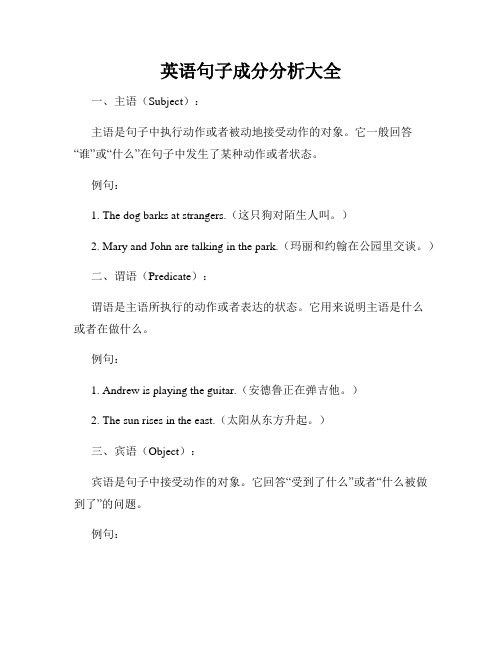
英语句子成分分析大全一、主语(Subject):主语是句子中执行动作或者被动地接受动作的对象。
它一般回答“谁”或“什么”在句子中发生了某种动作或者状态。
例句:1. The dog barks at strangers.(这只狗对陌生人叫。
)2. Mary and John are talking in the park.(玛丽和约翰在公园里交谈。
)二、谓语(Predicate):谓语是主语所执行的动作或者表达的状态。
它用来说明主语是什么或者在做什么。
例句:1. Andrew is playing the guitar.(安德鲁正在弹吉他。
)2. The sun rises in the east.(太阳从东方升起。
)三、宾语(Object):宾语是句子中接受动作的对象。
它回答“受到了什么”或者“什么被做到了”的问题。
例句:1. The teacher assigns homework to the students.(老师布置作业给学生。
)2. She bought a new car.(她买了一辆新车。
)四、表语(Predicate Nominative/Predicate Adjective):表语是用来说明主语的身份、性质、状态或者特征的成分。
它通常位于系动词后面,与主语相连。
例句:1. The cake smells delicious.(蛋糕闻起来很好吃。
)2. He became a doctor.(他成为了一名医生。
)五、定语(Adjective):定语用来修饰名词或者代词,可以说明它们的性质、状态或者特征。
例句:1. I saw a black cat.(我看到了一只黑猫。
)2. This is an interesting book.(这是一本有趣的书。
)六、状语(Adverb):状语用来修饰动词、形容词、副词或者全句,可以说明方式、时间、地点、原因等。
例句:1. Tom quickly ran to catch the bus.(汤姆快速地跑过去赶公交车。
英语句子成分分析分析解析

英语句子成分分析分析解析在英语中,句子可以被分解为不同的成分,包括主语、动词、宾语、定语和状语等。
下面是一些常见的句子成分及其分析解析:1. 主语(Subject):句子中的主要人或事物,执行动作或被动作所指向。
例如:I went to the store.分析:主语是I。
2. 谓语(Predicate):句子中的动作或状态,表达主语的行为。
例如:She is reading a book.分析:谓语是 is reading。
3. 宾语(Object):动词的直接接收者或受益者。
例如:He bought a new car.分析:宾语是 a new car。
4. 定语(Adjective):修饰名词或代词的形容词或词组。
例如:The big dog chased the cat.分析:定语是 big。
5. 状语(Adverb):修饰动词、形容词或其他副词的副词或词组。
例如:She runs quickly.分析:状语是 quickly。
例如:He became a doctor.分析:补语是 a doctor。
7. 同位语(Appositive):对名词或代词作进一步解释或补充说明。
分析:同位语是 John。
8. 状语从句(Adverbial Clause):起状语作用的从句。
9. 定语从句(Adjective Clause):起定语作用的从句。
例如:The book that I bought is very interesting.分析:定语从句是 that I bought。
以上是一些常见的英语句子成分及其分析解析。
要准确理解和运用句子成分,需要对语法规则有一定的了解,并在实践中积累经验。
英语句子成分分析
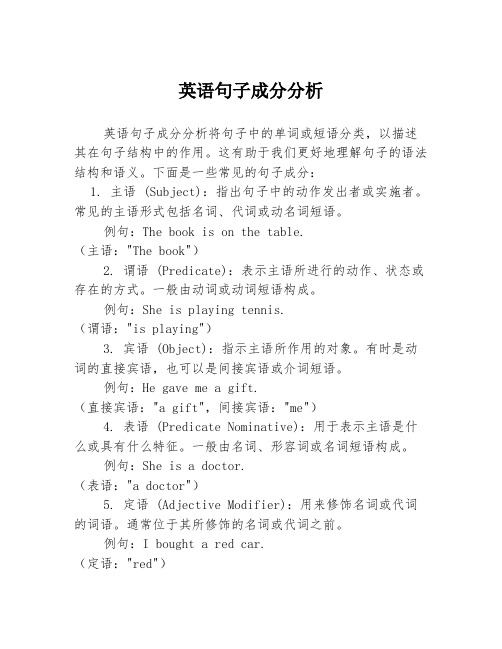
英语句子成分分析英语句子成分分析将句子中的单词或短语分类,以描述其在句子结构中的作用。
这有助于我们更好地理解句子的语法结构和语义。
下面是一些常见的句子成分:1. 主语 (Subject):指出句子中的动作发出者或实施者。
常见的主语形式包括名词、代词或动名词短语。
例句:The book is on the table.(主语:"The book")2. 谓语 (Predicate):表示主语所进行的动作、状态或存在的方式。
一般由动词或动词短语构成。
例句:She is playing tennis.(谓语:"is playing")3. 宾语 (Object):指示主语所作用的对象。
有时是动词的直接宾语,也可以是间接宾语或介词短语。
例句:He gave me a gift.(直接宾语:"a gift",间接宾语:"me")4. 表语 (Predicate Nominative):用于表示主语是什么或具有什么特征。
一般由名词、形容词或名词短语构成。
例句:She is a doctor.(表语:"a doctor")5. 定语 (Adjective Modifier):用来修饰名词或代词的词语。
通常位于其所修饰的名词或代词之前。
例句:I bought a red car.(定语:"red")6. 状语 (Adverbial Modifier):用来修饰动词、形容词、副词或整个句子的词语或短语。
例句:He ran quickly to catch the bus.(状语:"quickly")7. 补语 (Complement):用来补充、说明主语或宾语的信息,使句子更完整。
分为主语补语和宾语补语。
例句:She became a teacher.(主语补语:"a teacher")8. 插入语 (Parenthetical Expression):用来插入句子中,对句子进行附加说明或强调。
英语句子成分分析大全
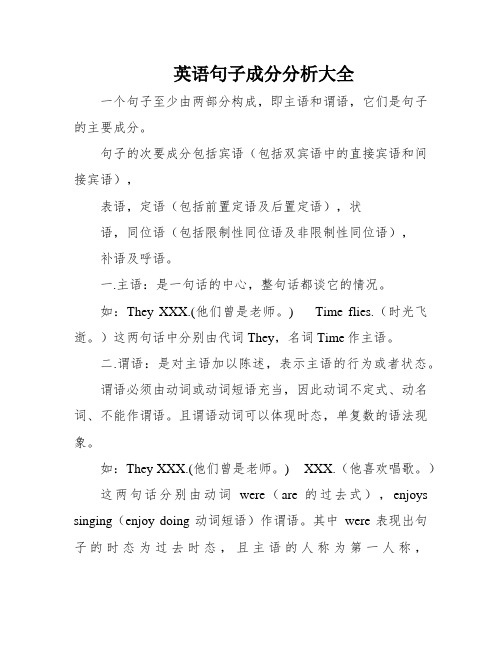
英语句子成分分析大全一个句子至少由两部分构成,即主语和谓语,它们是句子的主要成分。
句子的次要成分包括宾语(包括双宾语中的直接宾语和间接宾语),表语,定语(包括前置定语及后置定语),状语,同位语(包括限制性同位语及非限制性同位语),补语及呼语。
一.主语:是一句话的中心,整句话都谈它的情况。
如:They XXX.(他们曾是老师。
) Time flies.(时光飞逝。
)这两句话中分别由代词They,名词Time作主语。
二.谓语:是对主语加以陈述,表示主语的行为或者状态。
谓语必须由动词或动词短语充当,因此动词不定式、动名词、不能作谓语。
且谓语动词可以体现时态,单复数的语法现象。
如:They XXX.(他们曾是老师。
) XXX.(他喜欢唱歌。
)这两句话分别由动词were(are的过去式),enjoys singing(enjoy doing动词短语)作谓语。
其中were表现出句子的时态为过去时态,且主语的人称为第一人称,enjoyssinging表现出句子的时态为普通现在时,且主语的人称为第三人称。
三.宾语:表示动作的承受者。
宾语放在及物动词或者介词之后。
如:I play with him. (我和他玩。
) I like Chinese food.(我喜欢中国菜。
)这两句话平分别由人称代词him,名词food作宾语。
直接宾语与间接宾语:有的动词能够接双宾语,直接宾语指的是动词所涉及的物,间接宾语是指受益于动词所表示行为的人。
如:He gave me a book.(他给了我一本书)He gave a book to me这句话中a book为间接宾语,me为间接宾语。
又如:XXX.(我妈妈买了一个书包给我。
)这句话中schoolbag为直接宾语,me为间接宾语。
四.表语:用来说明主语的性质或状态。
接在系动词之后,其中接在系动词be后是最常见的情况。
系动词:看起来闻起来听起来感觉起来老是保持三变。
look smell sound feel be keep getseem turnXXX如They XXX.(他们曾是老师。
英语语法——英语句子成分分析

英语语法——英语句子成分分析I.八大成分的概念和构成1.主语(名词代词形):句子的主体,是谓语陈述,说明的对象。
2.谓语:表示主语的行为或进行的活动。
3.宾语:行为或活动的对象,接受者或受影响者。
5.补语:补充说明。
(由动词类别来决定)6.定语:对名词性形式进行范围限定。
7.同位语:对被修饰对象进行补充说明或进一步解释。
8.状语:修饰词,短语,从句和整句。
位置:自由自在。
1)修饰性状语:(时间,地点,肯定,否定,程度,频度,方式,伴随,原因,目的,比较等)。
2)连接性状语:(顺序,递进,转折,让步,结果,推论,比较)。
3)评述性状语:修饰整个句子,表示说话人的看法或态度。
II.成分关系1.补语跟着宾语表语跑:补语跟在宾语和表语的后面构成宾补和表补。
把有宾补的句子变成被动语态,则宾补就变成了主补。
To love others makes us happy…to love ourselves makes us lonely.(宾补)We are made happy to love others…we are made lonely to love ourselves.(主补)爱他人使我们幸福,在自己使我们孤单。
2.定语,同位(语)专把名词踹:定语,同位语修饰名词性形式Experience is the best teacher.(被定语所修饰的形式为名词)They are going to Melbourne, the beautiful city in southern Australia.(同位语所修饰的形式为名词)3.谓语动词由状语修饰When you reach for the stars, you may not quite get one, bu t you won’t come up with a handful of sand either.你想摘下天上的星星,可能一个也摘不下;但也不会一无所获。
英语句子成分结构详解

英语句子成分结构详解一、英语语句基本结构分析:(一)主谓宾结构:1、主语:可以作主语的成分有名词(如boy),主格代词(如you),数词,动词不定式,动名词等。
主语一般在句首。
注意名词单数形式常和冠词不分家!eg: The boy comes from America.He made a speech.Two and two is four.To be a teacher is my dream.Doing a research is a necessary step of covering a story.2、谓语:谓语由动词构成,是英语时态、语态变化的主角,一般在主语之后。
谓语可以是不及物动词(vi.)没有宾语,形成主谓结构,eg:We come.Many changes took place in my home town.注(以下这些词是不及物动词:表发生、出现的,如:take place, appear, happen, break out; 表来、去,如:come, go 等)3、宾语:宾语位于及物动词之后,一般同主语构成一样,不同的是构成宾语的代词必须是‘代词宾格’,如:me,him,them等。
除了代词宾格可以作宾语外,名词,动名词,不定式等可以作宾语。
eg:I will do it tomorrow.The boy needs a pen.I like swimming.I like to swim this afternoon.(二)主系表结构:1、主语:同‘主谓宾’结构。
2、谓语:联系动词(Link verb):be动词(am,is,are,was,were,have been);其他联系动词如:become成为,turn变成,go变和感官动词如:feel, touch, hear, see等。
其特点是联系动词与其后的表语没有动宾关系,表语多为形容词或副词,既,不可能是宾语。
英语句子成分分析

英语句子成分分析英语句子成分分析一.主语:主语(subject) 是一个句子的主题( theme),是句子所述说的主体。
它的位置一般在一句之首。
可用作主语的有单词、短语、从句乃至句子。
1.名词作主语。
如:A tree has fallen across the road. (一棵树倒下横在路上。
)Little streams feed big rivers. ( 小河流入大江。
)2.代词用作主语。
如:You’re not far wrong. (你差不多对了)。
He told a joke but it fell flat. (他说了个笑话,但没有引人发笑3.数词用作主语。
如:Three is enough. 三个就够了。
Four from seven leaves three. 7减4余3。
4.名词化的形容词用作主语。
The idle are forced to work. 懒汉被迫劳动。
Old and young marched side by side. 老少并肩而行。
5.副词用作主语。
如:Now is the time. 现在是时候了。
Carefully does it. 小心就行。
6.名词化的介词作主语。
如:The ups and downs of life must be taken as they e.我们必须承受人生之沉浮。
7.不定式用作主语。
如:To find your way can be a problem.你能否找到路可能是一个问题。
It would be nice to see him again.如能见到他,那将是一件愉快的事。
8. 动名词用作主语。
如:Smoking is bad for you. 吸烟对你有害。
Watching a film is pleasure, making one is hard work.看电影是乐事,制作影片则是苦事。
9. 名词化的过去分词用作主语。
英语句子成分分析(最完整版)
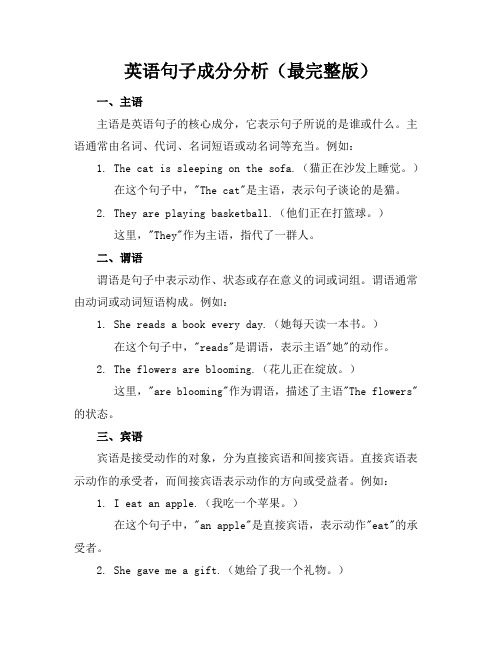
英语句子成分分析(最完整版)一、主语主语是英语句子的核心成分,它表示句子所说的是谁或什么。
主语通常由名词、代词、名词短语或动名词等充当。
例如:1. The cat is sleeping on the sofa.(猫正在沙发上睡觉。
)在这个句子中,"The cat"是主语,表示句子谈论的是猫。
2. They are playing basketball.(他们正在打篮球。
)这里,"They"作为主语,指代了一群人。
二、谓语谓语是句子中表示动作、状态或存在意义的词或词组。
谓语通常由动词或动词短语构成。
例如:1. She reads a book every day.(她每天读一本书。
)在这个句子中,"reads"是谓语,表示主语"她"的动作。
2. The flowers are blooming.(花儿正在绽放。
)这里,"are blooming"作为谓语,描述了主语"The flowers"的状态。
三、宾语宾语是接受动作的对象,分为直接宾语和间接宾语。
直接宾语表示动作的承受者,而间接宾语表示动作的方向或受益者。
例如:1. I eat an apple.(我吃一个苹果。
)在这个句子中,"an apple"是直接宾语,表示动作"eat"的承受者。
2. She gave me a gift.(她给了我一个礼物。
)这里,"a gift"是直接宾语,表示动作"gave"的承受者;"me"是间接宾语,表示动作的方向。
四、表语表语用来补充说明主语的身份、特征或状态,通常位于系动词(如be、look、seem等)之后。
例如:1. He is a teacher.(他是一名教师。
)在这个句子中,"a teacher"是表语,说明主语"He"的身份。
英语句子成分分析

英语句子成分分析英语句子的成分可分为主语、谓语、宾语、宾语补足语、表语、定语、状语、同位语及独立成分等,下面是我为大家整理的关于“英语句子成分分析”,欢迎大家阅读,更多资讯尽在实用资料栏目!小学英语句子成分分析一、主语1、主语表示某人(做某事),某物(怎么样),是谓语描述的对象。
2、主语一般位于句首。
如Harry Potter is the hero in this book. 哈利·波特是这本书的主人公。
(HarryPotter是主语)二、谓语1、谓语表示(某人)做某事,(某物)怎么样,用于说明主语。
2、谓语一般位于主语之后。
3、谓语与主语在人称和数上必须保持一致。
如I saw Andy yesterday. 我昨天看到安迪了。
(saw是谓语)三、宾语1、宾语表示的是动作、行为的对象。
2、宾语一般位于及物动词的后面。
如Andy often helps his classmates. 安迪经常帮助他的同学。
(classmates是宾语)四、表语1、表语表示是什么,怎么样,用于说明主语的特征,状态等。
2、表语位于系动词之后。
如Andy and I are friends. 安迪和我是朋友。
(friends是表语)五、定语1、定语用来修饰名词或代词,用来说明名词的品质与特征。
2、定语大多前置,有时也可以后置。
如Andy is an intelligent boy. 安迪是个聪明的男孩。
(intelligent是定语)六、状语1、状语表示行为发生的时间、地点、方式、程度、条件等。
2、状语可以位于句首,句中或句末。
如Andy did his homework carefully. 安迪认真地做家庭作业。
(carefully是状语)七、宾语补足语1、宾语补足语用来补充说明宾语,使宾语的意思更完整。
2、宾语补足语一般位于宾语之后。
如His blame made Andy cry. 他的责备让安迪哭了。
- 1、下载文档前请自行甄别文档内容的完整性,平台不提供额外的编辑、内容补充、找答案等附加服务。
- 2、"仅部分预览"的文档,不可在线预览部分如存在完整性等问题,可反馈申请退款(可完整预览的文档不适用该条件!)。
- 3、如文档侵犯您的权益,请联系客服反馈,我们会尽快为您处理(人工客服工作时间:9:00-18:30)。
语
语
㈠主语(subject)
句子说明的人或事物
• Jane is good at playing the piano.(名词) • She went out in a hurry. (代词) • Four plus four is eight. (数词) • To see is to believe. (不定式) • Smoking is bad for health. (动名词) • The young should respect the old(. 名词化的形容词) • What he has said is trueestion.
A. rose rise
B. raised rise
C. rose raise
D. raised raise
(三)宾语
动作的对象或承受者——及物动词或介词的宾语
Show your passport, please. (名词 ) She didn't say anything. ( 代词) How many do you want? - I want two. (数词) They sent the injured to hospital. (名词化的形容词) They asked to see my passport. (不定式) I enjoy working with you.(动名词) Did you write down what he said? (句子)
• Do you smell something burning?
• He made himself known to them.
• She asked me to lend her a hand.
同位语
位于名词或代词后面,说明它们的性质和情况
We young people should respect the old. 名词 He himself will do the experiment. 代词 He is the oldest among them four. 数词 He told me the news that our team won the game. 从句
you have had, you must _______ the
people heart and soul.
A. serve
B. serve for
C. serve to
D. serve on
2. The pupil ___ his right hand,
obviously hoping to _____ to answer
(六)宾语补足语
有些及物动词除了有一个直接宾语以外,还要有一个宾 语补足语,说明宾语的身份和状态以补充其意义不足, 使句子的意义完整。这类常用的及物动词有 : make, consider, cause, see, find, call, get, have, let.
• I found the book interesting.
• 宾语分为直接宾语和间接宾语. • He gave me some books.
↓ 间接 宾语
↓ 直接 宾语
●please pass me the book. ●He bought his girlfriend some flowers.
(四)表语
在系动词后的部分就是表语 1. The war was over. 2. They seem to know the truth. 3. Time is precious. 4. I’m not quite myself today. 5. That remains a puzzle. 6. I don’t feel at ease.
句子成分
定义 :构成句子的各个部分叫做句子成 分。句子成分有主要成分和次要成分; 主要成分:主语和谓语 次要成分:表语、宾语、定语、状语、 补足语、同位语
1. I met my best friend Tom at the station yesterday.
↓↓ ↓
↓↓
↓
主谓 定 宾 同
状
语语 语 语 位
(It形式主语,主语从句是真正主语)
㈡谓语
说明主语的动作、状态和特征 • 简单谓语:由动词或动词词组组成 • I saw the flag on the top of the hill? • He looked after two orphans. • 复合谓语 由情态动词或助动词+动词; • He can speak English well. • She doesn’t seem to like dancing
• His spoken language is good. (过去分词)
定语后置:
如果定语是由一个单词表示时,通常要前置。 而由一个词组或一个句子表示时,通常则后置
The girl in red is his sister. The girl standing under the tree is his daughter. Do you know the man who spoke just now?
4)感官系动词 feel, smell, sound, taste 例如:This kind of cloth feels very soft. 这种布手感很软。
5)变化系动词 become, grow, turn, fall, get, go, come, run. 例如: He became mad after that. 自那之后,他疯了。
station. 宾语+宾补
句子类型
• 句子种类两种分类法 1、按句子的用途可分四种: 1)陈述句(肯定、否定):
He is six years old. She didn’t hear of you before. 2)疑问句(一般、特殊、选择、反意): Do they like skating? How old is he? Is he six or seven years old? Mary can swim, can’t she? 3)祈使句:Be careful, boys; Don’t talk in class. 4)感叹句:How clever the boy is!
Look at me carefully!
类似的还有:agree, go, work, listen, look, come, die, belong, fall, exist, rise, arrive, sit, sail, hurry, fail, succeed...
既可以用作及物又可以用作不及物的动 词,其意义不变。 如begin 都是作“开始”讲。 Everybody, our game begins. Let us begin our game. 类似的还有:start, answer, sing, close, consider, insist, read, learn, prepare, pay, hurt, improve...
系动词
1)状态系动词(be动词) 例如: He is a teacher.
2)持续系动词 keep, remain, stay 例如: He always kept silent at the meeting. 他开会时总保持沉默。
3)表像系动词 seem, appear, look,
例如: He looks tired. 他看起来很累。
(六)状语
状语的功用:状语说明地点、时间、原因、目的、 结果、条件、方向、程度、方式和伴随状况等。 • I will be back in a while. • They are playing on the playground. • He was late because he got up late. • He got up so late that I missed the train. • I waited to see you. • He often went to school by bus. • His parents died, leaving him an orphan. • Please call me if it is necessary. • This book is very interesting.
易误用作及物动词的9个不及物动词:
误:deal a problem 正:deal with a problem 处理问题 误:depend sb. 正:depend on sb. 依靠(依赖)某人 误:insist doing sth. 正:insist on doing sth. 坚持要做某事
误:knock the door 正:knock on [at] the door 敲门 误:operate sb. 正:operate on sb. 为某人做手术 误:participate sth. 正:participate in sth. 参加某事 误:refer sth. 正:refer to sth. 查阅(参考)某物
1. I met my best friend Tom at the station yesterday.
↓↓ ↓
↓↓
↓
主谓 定 宾 同
状
语语 语 语 位
语
语
句子成份练习
1、You should study hard. 状语 2、The teacher got very angry. 表语 3、The boy told me his story. 间语+直宾 4、We elected him our monitor. 宾语+宾补 5、I told him to open the window. 宾语+宾补 6、We watched the train leaving the
